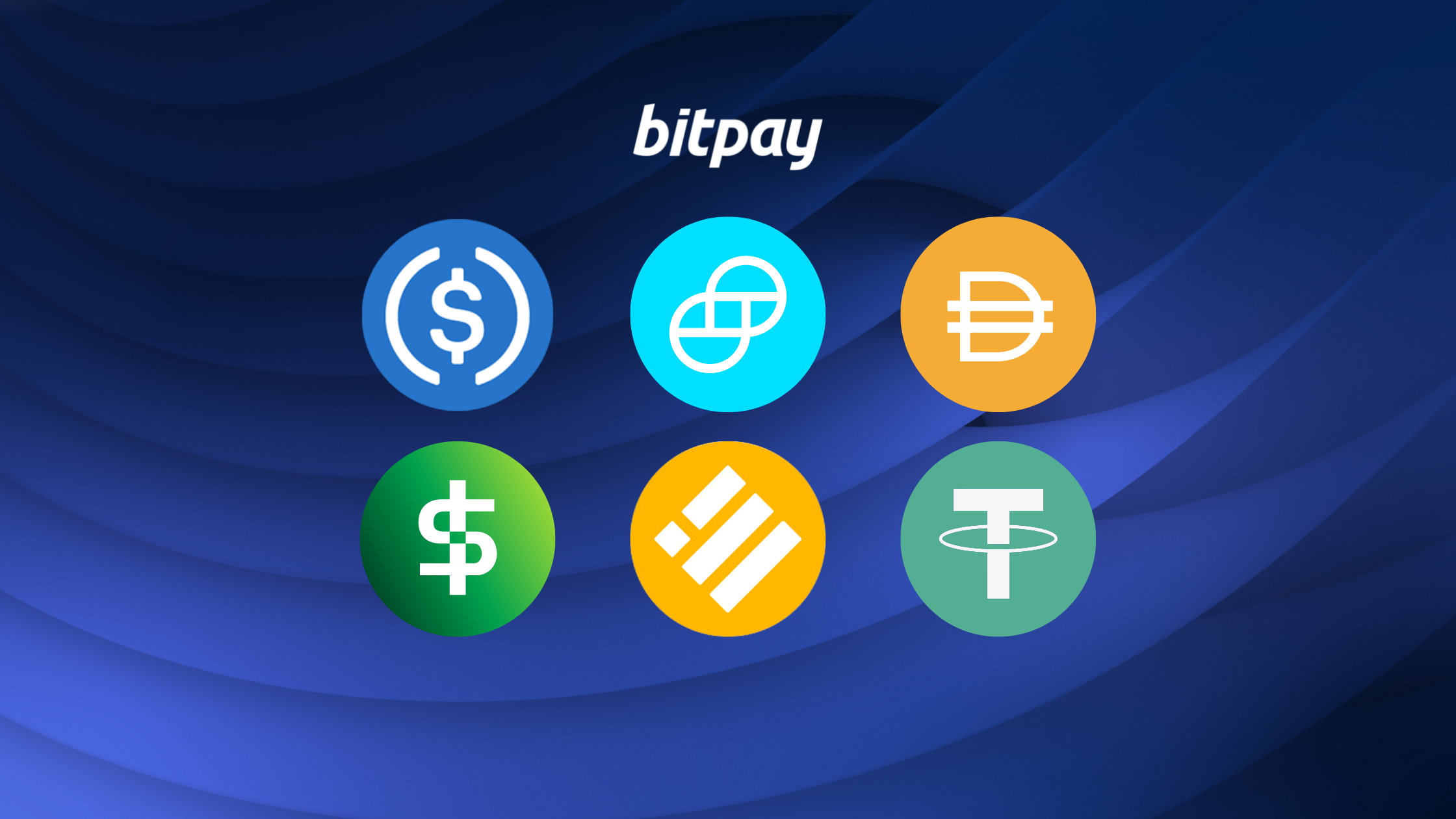Cryptocurrency is known for price volatility, which can see the value of a coin rise or fall significantly over a short period. The exception being the subset of cryptocurrencies known as stablecoins, which are designed to maintain a set value at all times, usually a 1:1 exchange rate with the U.S. dollar. Because of their price stability, stablecoins don’t get as much hype compared to more speculative cryptocurrencies. However, thanks to the variety of uses and benefits they offer, stablecoins are extremely popular. In fact, two of the five largest cryptocurrencies by market cap are stablecoins, Tether (USDT) and USD Coin (USDC), with a combined value of more than $100 billion. Ahead, we’ll explore the many ways to use and spend stablecoins.
What are stablecoins?
Stablecoins are a type of cryptocurrency with values linked or “pegged” to other assets like gold or U.S. dollars. No matter what’s going on in the crypto market or the broader economy, one unit of a stablecoin should always be redeemable for one unit of its underlying reserve asset, and vice versa (i.e. 1 USDC=1 USD). Stablecoin issuers maintain these price pegs by holding reserves of fiat currency or other assets equivalent to the amount in circulation. Most stablecoins’ reserves are audited regularly with the findings made public, usually on the issuer’s website. Stablecoins are meant to bridge the gap between traditional finance (TradFi) and digital assets, serving as a sort of blockchain-based cash equivalent.
Different ways you can use stablecoins
It’s unlikely you’ll earn enough profits trading stablecoins to pay for your next Lambo, but that’s not what stablecoins are really all about. Where they really shine is when it comes to functionality. Some of the most popular uses for stablecoins include:
- Staking/DeFi/Web3
- Crypto trading
- Holding stable funds on blockchain
- Remittance and payouts
- Spend with merchants that accept crypto
- Load onto crypto card to spend like cash
- Buy gift cards with stablecoins
Staking & DeFi
There’s a vast universe of communities, activities and passive income opportunities in the world of crypto, and many of them are only accessible through the Ethereum blockchain. One major example is decentralized finance (DeFi), a rapidly growing ecosystem of peer-to-peer financial products and services meant to take place outside of the traditional banking system. Stablecoins’ price stability makes them an ideal asset for “staking”, locking up coins for a set period of time within a protocol or network in exchange for passive interest income (“yield”).
Crypto trading and swapping
Buying cryptocurrency from an exchange like Coinbase or Kraken using fiat incurs the usual exchange fees. However, swapping a stablecoin that already exists on the blockchain for another asset can be a more cost-effective way to attain digital assets. Many investors take advantage of this and do much of their crypto trading using stablecoins to avoid or decrease crypto fees.
Holding stable funds on blockchain
Because stablecoins’ value typically doesn’t fluctuate, crypto traders often exchange more volatile coins for stablecoins to shield their holdings during times of big market swings. This also offers holders a port in the storm during periods of high inflation, when the value of fiat currency is steadily eroded. Stablecoins allow users to ride out market turmoil without taking their holdings out of the ecosystem.
Remittance and payouts
Since their stability is on par with fiat, stablecoins are often used for crypto payouts or remittances. This is particularly helpful when making cross-border payments, which can be costly and slow if using fiat. With stablecoins, these transactions settle quickly and without bank or wire fees.
Spend with merchants that accept crypto
BitPay partners with thousands of top brands and retailers to enable direct crypto payments, including AMC Theaters, Newegg, Microsoft and many more. Check out our Merchant Directory for a curated listing of top companies that accept stablecoins for their goods or services from virtually any crypto wallet.
Buy, store, swap and spend stablecoins with BitPay
Load onto a crypto card like BitPay Card and spend like cash
If you’re looking for a convenient way to spend stablecoins, the BitPay Card offers a familiar solution. Simply download the BitPay app and apply for the card, and in minutes you’ll be ready to load it up with stablecoins like USD Coin (USDC), Binance USD (BUSD), Pax Dollar (USDP), Gemini Dollar (GUSD) and Dai (DAI). You can then spend the balance just like cash anywhere in the world Mastercard is accepted. This also comes in handy if you get paid in crypto and need a fast and inexpensive way to cash out. Learn more about how crypto debit cards work.
Buy gift cards with stablecoins
Another easy way to spend your stablecoin of choice is to buy gift cards through the BitPay app or Chrome extension. Choose from hundreds of brands like Uber, Home Depot, Hotels.com and many more.
Why should I use stablecoins?
Stablecoins offer a great deal of utility and flexibility, facilitating a variety of important functions in crypto while offering calmer waters in a market prone to big ups and downs. They play a major role in bridging the gap between traditional and digital assets, and unlock a whole new realm of utility and income-generating functionality through Web3 and DeFi. Some of the most common reasons crypto users gravitate towards stablecoins include:
- Price stability
- Low fees
- Compatible with most popular wallets
- Variety of ways to spend and use
Which stablecoin should I use?
Stablecoins generally all serve the same purpose: to combine the flexibility of digital assets with the price stability of fiat. All stablecoins work to achieve the same even-keeled pricing, but different coins may have additional attributes that make one a better choice for you over another. This could include anything from the organization issuing the coin, its method of maintaining its peg or the transparency of their reserve audits. As of December 2022, some of the top stablecoins are:
- Tether (USDT) – Considered the very first stablecoin, Hong Kong-based iFinex’s Tether (USDT) is the third largest cryptocurrency by market cap, trailing only Bitcoin (BTC) and Ether (ETH).
- USD Coin (USDC) – Issued by a joint venture between Coinbase and Circle Financial called Centre, USDC represents tokenized U.S. dollars on the Ethereum blockchain.
- Binance Dollar (BUSD) – Ethereum-based dollar-backed stablecoin issued by Paxos and crypto exchange behemoth Binance.
- Dai (DAI) – Considered one of the earliest examples of DeFi to go mainstream, DAI is an Ethereum-based stablecoin regulated and maintained by a decentralized autonomous organization called MakerDAO.
- Pax Dollar (USDP) – Once called Paxos Standard (PAX), USDP is the native crypto of Paxos, a New York State Department of Financial Services (NYDFS)-regulated financial institution.
- Euro Coin (EUROC) – Similar to USDC, but pegged to the euro instead of the US Dollar.







